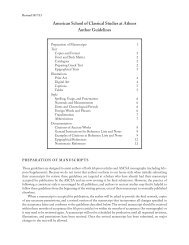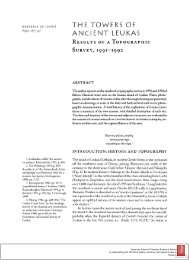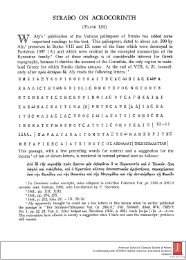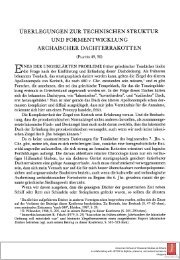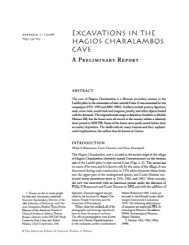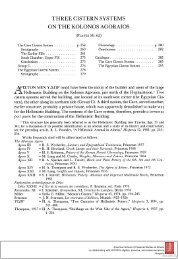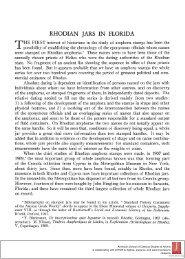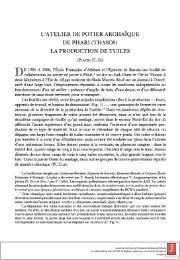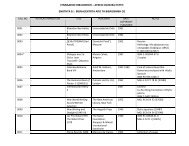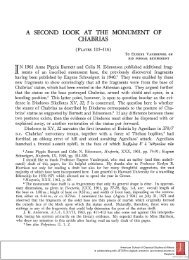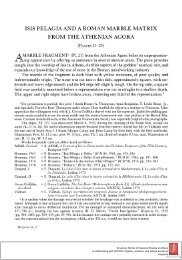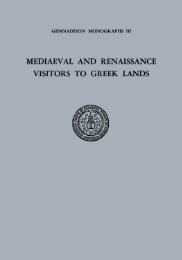the attic stelai - The American School of Classical Studies at Athens
the attic stelai - The American School of Classical Studies at Athens
the attic stelai - The American School of Classical Studies at Athens
You also want an ePaper? Increase the reach of your titles
YUMPU automatically turns print PDFs into web optimized ePapers that Google loves.
268 W. KENDRICK PRITCHETT<br />
10. CrV'OKtEa (IV, 11 ). <strong>The</strong> term indic<strong>at</strong>es a tenement house occupied by several<br />
persons. A. Jarde transl<strong>at</strong>es it as ' maisons de rapport '; 64 Liddell-Scott-Jones as<br />
'house in which several families live.' <strong>The</strong> word has frequently been transl<strong>at</strong>ed as<br />
'apartment-house,' for which Finley has recently suggested <strong>the</strong> substitute term<br />
'multiple-dwelling,' 65-a term which brings out <strong>the</strong> functional and, so to speak, nonarchitectural<br />
connot<strong>at</strong>ion <strong>of</strong> <strong>the</strong> word. One <strong>of</strong> <strong>the</strong> key passages for <strong>the</strong> meaning is<br />
Aischines (I. 124): " Where several people hire one house and occupy it, dividing it<br />
between <strong>the</strong>m, we call it a synoikia, but where one man dwells, a house." Clearly, <strong>the</strong><br />
synoikia was rented. In Aristophanes, Equites, 1001, <strong>the</strong> sausage-man boasts th<strong>at</strong> he<br />
had a two-storey house and two synoikiai.66 In A<strong>the</strong>naeus, XII, 542 f, sudden<br />
prosperity results f-rom owning synoikiai. <strong>The</strong> <strong>The</strong>saurus Graecae Linguae (s.v.)<br />
reports a L<strong>at</strong>in gloss on <strong>the</strong> word as ' insula.' <strong>The</strong> synoikia, <strong>the</strong>n, is not only a multiple-dwelling,<br />
it is also a tenement; 67 so <strong>the</strong> transl<strong>at</strong>ion ' tenement-house ' is adopted.68<br />
11. Xcoptov (VI, 80, 94, 96, 98, 102, 133; X, 16, 17, 18). <strong>The</strong> word does not<br />
occur in Homer or in Tragedy. It is found first in Herodotos. Schmidt, in his study<br />
<strong>of</strong> Greek synonyms, defines chorion as follows: " Xcoptwov ist unser ' Ort ', bezeichnet<br />
aber allgemeiner jedes bestimmte Grundstiick, z.B. in einer Stadt oder einen Lande,<br />
ebenso eine in ihrer Eigentiimlichkeit hervorspringende Gegend; daher erscheint ein<br />
Xcwptov <strong>of</strong>t als Teil einer Xcipa, aber auch eines anderen Xwpiov." " In Thucydides<br />
alone, chorion is quaiified by <strong>the</strong> following adjectives: ajvwEo'v (I, 13, 5), a&iLEVov<br />
(II, 25, 4), aXTE8ov (VII, 78, 4), aavE`s (IV, 29, 3), 8aoiv (IV, 29, 4), E'ITKWKaJOV (VI,<br />
85, 2), E'pqpov (I, 52, 2), C0,u8Eq (VII, 26, 2), pelreT&pOV (IV, 32, 3), TErpWpC.8Eq (IV,<br />
9, 2), vrp6cravrE (IV, 43, 3), cr'ro&ropov (VII, 73, 1), crrEVOV (VII, 79, 1), 4-qXo'v<br />
(III, 97, 2), and XaXEmov (IV, 9, 2).<br />
In epigraphical texts dealing with land, <strong>the</strong> word has been variously transl<strong>at</strong>ed:<br />
as ' field ' by Meritt,70 as ' ordinary farm land ' by John Day,7" as 'farm ' by Fine.72<br />
Kent, in drawing a distinction between kepos and chorion in <strong>the</strong> Delian records, wrote<br />
64 Cereales, p. 147.<br />
65 Op. cit., pp. 64-65.<br />
6 For wh<strong>at</strong> I believe is <strong>the</strong> correct interpret<strong>at</strong>ion <strong>of</strong> this line, see R. A. Neil, <strong>The</strong> Knights <strong>of</strong><br />
Aristophcanes, Cambridge, 1901, ad loc. Neil in effect corrects <strong>the</strong> common interpret<strong>at</strong>ion based on<br />
<strong>the</strong> gloss <strong>of</strong> <strong>the</strong> scholiast th<strong>at</strong> synoikia is an apostasis or phanoptes.<br />
67 For a construction excav<strong>at</strong>ed <strong>at</strong> Delos, which M. Holleaux suggests was a synoikia, see <strong>the</strong><br />
report in Comptes rendus de l'Acad. des Inscr., 1904, p. 737.<br />
68<br />
Cf. W. S. Maguinness, Herma<strong>the</strong>na, LXIX, 1947, p. 69.<br />
69<br />
J. H. H. Schmidt, op. cit., II, p. 3. Examples are collected on pp. 9-13. Cf. also Liddell-<br />
Scott-Jones, s.v.<br />
70<br />
Hesperia, V, 1936, pp. 393 ff.<br />
7' Ec. Hist. <strong>of</strong> A<strong>the</strong>ns, p. 231.<br />
72 op. cit., pp. 72, 81, etc.



